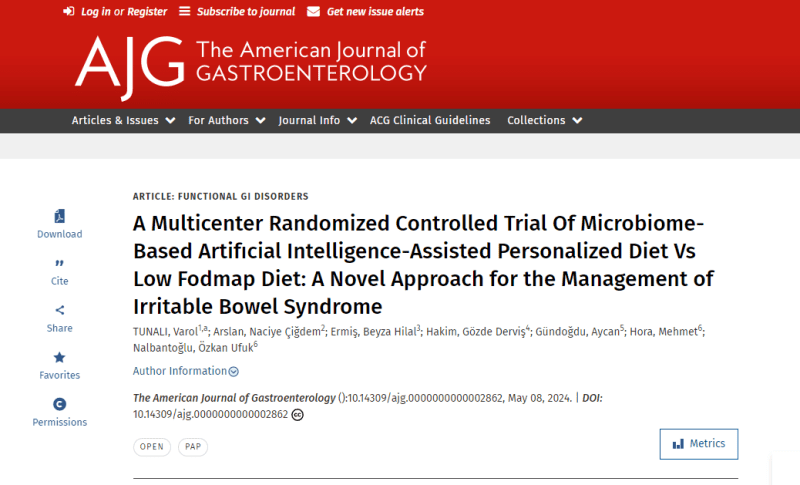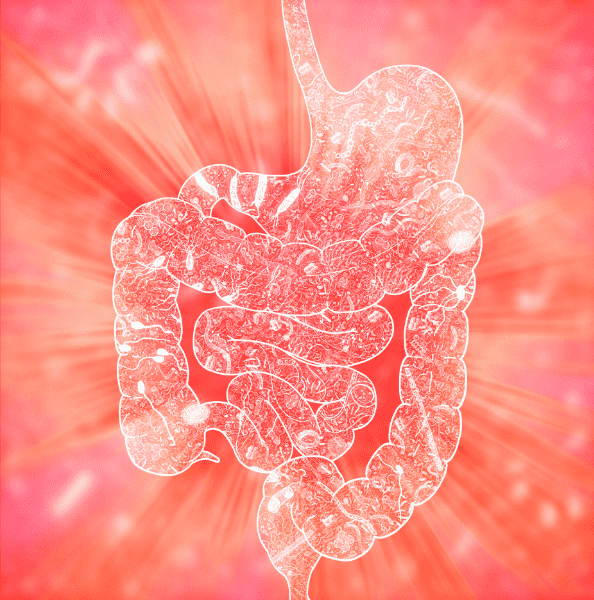blog, IBS, Microbiome, Nutrition, Uncategorized
Revolutionizing IBS Management: AI-Assisted Personalized Nutrition Leads the Way
Irritable bowel Syndrome (IBS) is a chronic gastrointestinal disorder characterized by abdominal pain, cramping, gas, bloating, and altered bowel habits. Depending on the symptoms, it can be categorized into three key subtypes: IBS-D (IBS-diarrhea), IBS-C (IBS-constipation), and IBS-M (IBS-mixed). This complex disease can significantly impact quality of life, leading to frustration and daily limitations for many sufferers. While there is currently no cure for IBS, management strategies focus on controlling symptoms and improving overall well-being.
Our groundbreaking research, which was recently published in The American Journal of Gastroenterology, reveals the remarkable impact that an AI-assisted personalized diet plan can have on improving symptoms for patients with IBS. We compared the efficacy of our Enbiosis personalized diet (PD) model to that of a low FODMAP diet (LFD), a one-size-fits-all approach, with exciting results, so let’s explore the findings from our study in more detail.
Table of Contents
About the Study

This multicenter randomized trial included 121 participants, 70 of whom were assigned to receive AI-assisted PD (provided by Enbiosis) and 51 of whom were assigned to receive LFD. As part of the AI-assisted PD, participants were provided with tailored diet plans designed to optimize the composition of their unique microbiome. Participants following the LFD had a restricted intake of foods that contained fermentable oligosaccharides, monosaccharides, disaccharides, and polyols. Both groups were given these interventions for a period of 6 weeks.
During the trial, researchers evaluated the following outcomes: symptom severity, anxiety, depression, microbiome modulation, and quality of life.
Key Study Findings
Improvement in IBS Management
Participants assigned to the AI-assisted PD group experienced a significant improvement in their IBS severity scores (IBS-SSS), regardless of their subtype of IBS. However, the effect size was larger for patients with IBS-D.
Specifically, patients saw significant improvements in their abdominal pain (both the severity and frequency of pain), abdominal distension, dissatisfaction with bowel habits, and life interference in general. These results demonstrate that a personalized diet comprehensively addresses the entire spectrum of IBS symptoms.
Improvement in Anxiety Levels
Interestingly, individuals with IBS are more likely to experience mental health problems. This could be due to the close relationship between the gut and the brain, or as a direct result of the unpredictable and often debilitating symptoms of the condition. The results of this study show that participants following an AI-assisted PD experienced a substantial improvement in their anxiety levels, regardless of their IBS subtype. AI-assisted PD also led to significant improvements in IBS-specific quality of life (IBS-QOL) scores for participants with all IBS subtypes.
Shifts in Microbiome Diversity
Participants who followed the AI-assisted PD experienced remarkable positive alterations in the diversity of their microbiome. This included an increase in the abundance of beneficial bacteria such as Faecalibacterium prausnitzii (which plays a vital role in reducing inflammation, modulating immune responses, and maintaining the integrity of the intestinal barrier) and a decrease in the Ruminococcaceae family (which have been found to positively correlate with IBS symptom scores). There were no comparable changes in the LFD group.
Unlike traditional IBS management approaches, which focus on relieving symptoms, personalized nutrition helps to promote long-term gut health and overall well-being by addressing underlying gut dysbiosis. The increases in alpha and beta diversity seen in this study support the comprehensive impact that our AI-assisted PD can have on gut health compared to conventional dietary approaches, such as LFD.

High Diet Satisfaction
Compliance is key when it comes to dietary interventions. Long-term changes to gut health can only be achieved through a long-term commitment to diet and lifestyle changes.
Our diet satisfaction survey revealed that a staggering 75% of participants following the AI-assisted PD were committed to following the diet for life, compared to just 12.5% of participants following the LFD. This reflects the ease and empowerment of following a diet aligned with your unique microbiome profile and individual preferences. Compared to the FODMAP diet, which can be very strict and restrictive, a PD is more sustainable, offering greater flexibility and a wider range of food choices.
Further Studies Confirm the Benefits of Personalized Nutrition
The exciting results reported in this research have also been confirmed by other studies using our innovative, tailored dietary approach. The Enbiosis personalized nutrition model was used in a similar study to develop a customized nutrition plan for patients with IBS-M. After six weeks of following a personalized nutrition diet, the patients experienced a significant improvement in their IBS severity scores (IBS-SSS), as well as a significant increase in Faecalibacterium and also increases in Bacteroides and Propionibacterium (all of which can play a beneficial role as part of a healthy microbiome). Notably, improvements in IBS severity scores were significantly higher for patients following the personalized nutrition diet than for those assigned a standard IBS diet.
Likewise, an AI-assisted PD (provided by Enbiosis) performed significantly better than conventional therapy when used to manage symptoms of functional constipation. This was demonstrated by an improvement in patient-reported outcomes, including quality of life scores and number of bowel movements per week.
These findings suggest that personalized diets can offer a potential solution for individuals suffering from multiple digestive problems.
What Does This Mean for the Future of IBS Management?

This research highlights a significant milestone in IBS management. Tailored dietary approaches, such as that provided by Enbiosis, offer a comprehensive strategy for improving the long-term health of patients with IBS. Extending beyond symptom relief, AI-powered personalized nutrition offers a means of optimizing microbial gut communities and improving overall health outcomes. Ultimately, personalized nutrition powered by AI has the potential to revolutionize the way we approach IBS care.


 العربية
العربية Русский
Русский Português
Português 中文 (中国)
中文 (中国) Türkçe
Türkçe Spanish
Spanish Polski
Polski

